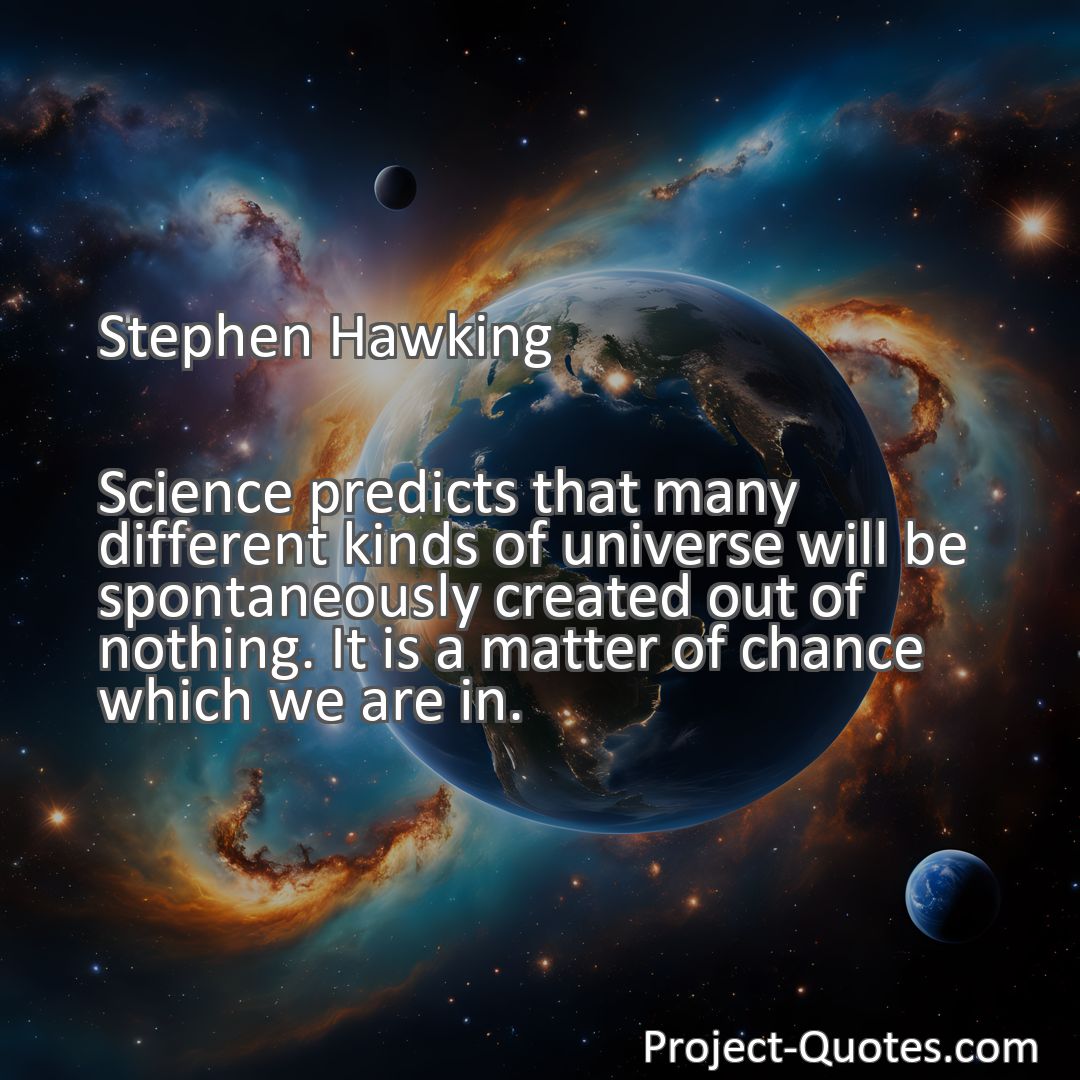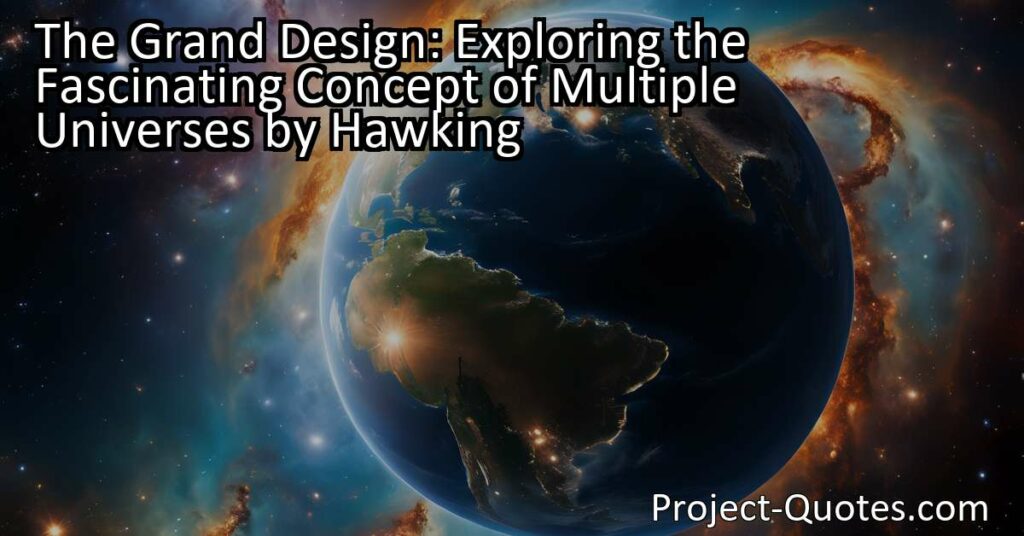Science predicts that many different kinds of universe will be spontaneously created out of nothing. It is a matter of chance which we are in.
Stephen Hawking
In “The Grand Design,” Hawking explains the captivating concept of multiple universes being spontaneously created out of nothing. According to this theory, these universes can materialize through quantum fluctuations, and it is purely a matter of chance as to which one we exist in. While this idea remains theoretical and requires further research, it encourages us to explore the mysteries of the cosmos and stimulates our curiosity about the nature of our own reality.
Table of Contents
- 1 Science predicts that many different kinds of universe will be spontaneously created out of nothing. It is a matter of chance which we are in.
- 2 Stephen Hawking
- 3 Meaning of Quote – Science predicts that many different kinds of universe will be spontaneously created out of nothing. It is a matter of chance which we are in.
- 4 Freely Shareable Quote Image
- 5 Related
Meaning of Quote – Science predicts that many different kinds of universe will be spontaneously created out of nothing. It is a matter of chance which we are in.
Have you ever wondered about the origins of the universe and whether it happened by chance? Well, according to science, there is a fascinating concept that suggests that numerous kinds of universes can be created out of nothing. Yes, you heard that right! It may sound mind-boggling, but scientists believe that the universe we currently inhabit was simply a result of chance. So, let’s delve into this intriguing idea and explore the notion of multiple universes.
To begin with, we need to understand the concept of a “multiverse.” Just like our universe, which consists of all matter, energy, and space, a multiverse is the hypothetical idea of many universes coexisting. Within this vast multiverse, each universe may have its own set of physical laws and conditions, making them distinct from one another. Now, you might be thinking, “How can universes spontaneously emerge out of nothing?” Let’s take a closer look!
Imagine a hypothetical scenario where there is absolutely nothing no matter, energy, or space. From this void, quantum mechanics, a branch of physics that deals with the behavior of particles on a subatomic scale, suggests that universes can materialize due to quantum fluctuations. These fluctuations are essentially the spontaneous appearance and disappearance of particles within a vacuum.
According to the famous physicist, Stephen Hawking, it is precisely these quantum fluctuations that can provide a mechanism for spontaneous universe creation. In his book “The Grand Design,” Hawking explains that in a universe governed by quantum mechanics, there is no such thing as true nothingness. Instead, there are temporary fluctuations in the energy of empty space. These fluctuations can trigger the formation of particles, such as photons or even particles that make up matter. Hence, a new universe with its own set of physical laws and properties can be born.
Now, you might be asking, “If multiple universes can be created out of nothing, what determines which one we exist in?” Well, according to the same theory, it is purely a matter of chance. Just like flipping a coin, there is no way to predict its outcome whether it will be heads or tails. Similarly, when universes are spontaneously created, it is impossible to determine beforehand which one will come into existence.
If we think about it, this idea is truly extraordinary. It implies that there could be an infinite number of universes, each with its own set of physical constants and fundamental laws that control how matter and energy interact. Some of these universes may have completely different properties than ours, possibly rendering life as we know it impossible. On the other hand, some could possess conditions that are remarkably similar to our own, providing the necessary elements for the emergence and sustenance of life.
This concept of a multiverse also raises intriguing questions about the existence of intelligent life beyond our own universe. If there are countless universes, statistically speaking, there’s a higher chance that some of them may harbor intelligent beings. Perhaps, in some of these universes, intelligent life has already progressed far beyond our current level of understanding. Maybe they have mastered interdimensional travel or have developed technologies that seem like pure science fiction to us.
However, it’s important to note that the idea of multiple universes and the concept of a multiverse are still highly speculative and remain within the realm of theory. While scientists like Hawking have put forth these fascinating ideas, testing or directly observing other universes is currently beyond our technological capabilities. Consequently, these concepts are primarily theoretical and still need further research and evidence to validate their existence.
Nonetheless, exploring the notion of multiple universes is not only intellectually stimulating but also encourages our imagination. It allows us to ponder the vast possibilities that lie beyond the boundaries of our visible universe, stimulating our curiosity about the nature of reality and our place within it.
In conclusion, the quote “Science predicts that many different kinds of universe will be spontaneously created out of nothing. It is a matter of chance which we are in” sheds light on the notion of a multiverse a hypothetical concept where numerous universes can coexist, each with its own set of physical laws and conditions. According to this idea, universes can be created through quantum fluctuations, ultimately making it a matter of chance as to which one we inhabit. While this concept is captivating and mind-expanding, it remains theoretical and requires further research and evidence. Nonetheless, contemplating the existence of multiple universes encourages us to explore the mysteries of the cosmos and stimulates our innate curiosity about the origins and nature of our own reality.
I hope this quote inspired image brings you hope and peace. Share it with someone who needs it today!


